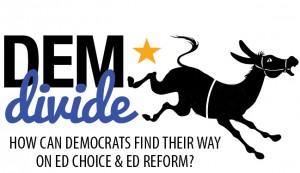Editor’s note: This is the third post in our series on the Democratic Party’s growing divide over ed reform and ed choice.

by Myles Mendoza
Mayor Rahm Emanuel is the in the political fight of his life. As a result of challenging the status quo by fighting for reform in Chicago Public Schools, Emanuel’s reign as mayor of one important cities in the United States is not guaranteed to continue.
Here’s one reason why: the mayor polls poorly among the city’s many African-Americans. In fact, only eight percent of them would support Emanuel if the election were held the today.
That’s one of the reasons why Chicago Teacher’s Union President Karen Lewis is currently entertaining the idea of a possible mayoral run. According to a recent Chicago Sun Times poll, she was leading Emanuel 45 percent to 36 percent with 18 percent of the likely voters undecided.
Previously, the Mayor faced an even tougher fight against another potential candidate, Cook County Board President Toni Preckwinkle. Although she withdrew, a race against Preckwinkle showed Emanuel losing by 24 points.
While, recent Ed Choice Illinois polling shows the Mayor now ahead by 12 points generally and by 3 points in the African-American community, it is clear his greatest challenge is with African-Americans. How did the Mayor get into this situation?
When he first entered office, Emanuel rightly assessed that African-American neighborhoods were getting the short end of the stick when it came to the quality of the education they received.
Emanuel looked to the education reform community for solutions. Chief among them was the concept of making schools accountable by tying eligibility for public dollars to performance.
That’s why he expanded high-performing charters like Noble Street and Urban Prep and shut down the highest amount of low-performing schools in American history – the majority of which were located in African-American communities.
But, in doing so, he made a fatal flaw.
He never approached the African-American community to get their input about which schools should expand and which should close.
This lack of community engagement caused high-performing, new charter schools to be greeted with suspicion rather than open arms. Community leaders led protests against the schools, arguing that changes were coming from the top down and the top was made up of mostly white decision makers.
It was a miscalculation by the Mayor and his staff to assume that just because high-performing charters had wait lists and low-performing schools were under-enrolled, that those numbers would serve as a de facto poll of the African-American community’s sentiment toward the Mayor.
The African-American community has a rich tradition of wanting to take ownership of their own affairs; to be the masters of their own destinies, responsible for both the good and bad in their communities.
Unfortunately, Mayor Emanuel took exactly the opposite approach. He and the CPS board hoarded control over decision-making and left parents and community leaders without a seat at the table. Naturally, leadership in the community reacted and the polls of Lewis and Preckwinkle are direct evidence.
Civil Rights history offers a lesson the mayor would do well to learn especially as he struggles for his political life.
In 1964, 30 educational institutes known as Freedom Schools opened in Mississippi. The schools catered to otherwise marginalized black students through their curricula, programming and culture.
Freedom Schools were so successful they drew triple the expected enrollment after their first summer open.
Success lied in the social dynamic Freedom Schools represented. Through Freedom Schools, the African-American community was able to exercise social, political, and economic power. African-American students no longer languished in the failing classrooms of White America’s schools, but developed as thinkers and leaders in their own liberated space.
Mayor Emanuel’s actions last summer weren’t an attack on the Chicago Teacher’s Union or a departure from Democratic politics but rather an issue of race and self destiny. While union and Democratic leaders are the prominent figures opposing the mayor, current political realities fundamentally signify the black community’s demand for self-determination and political power.
African-Americans want school choice. In fact, 76 percent of city’s African-American community supports the use of public dollars to fund their private education.
They want the ability to send their children to schools controlled by their communities.
If the mayor wants to win, he needs to listen to the city’s African-American community – particularly their calls to be in control of their own educational destiny.
Myles Mendoza is executive director of Ed Choice Illinois.
Read the rest of the Dem Divide series below
Gloria Romero: Money leads Democrats to put teachers unions over poor kids
Ben Austin: Democratic leaders will follow parents on ed reform, eventually
Richard Whitmire: Houston & D.C. offer paths for ed reform Democrats
Joe Williams: Suburbs hold key to resolving Dem tensions over school choice
Rep. Marcus Brandon: African-Americans must blaze own path on school choice, ed reform
Doug Tuthill: New type of teacher union is key to relieving Democratic tensions



Urban Prep is not exactly the high performing school this post makes it out to be. In 2012 on 17% of its students passed state exams which was below the city average. This is pure propaganda.
https://www.suntimes.com/news/education/5061648-418/help-for-charter-schools.html#.U-JWFsnD_qA
Hi Parent and teacher,
While you did cite an article that looked only student results within one district, ed experts also try control for variables like race and income.
For example CPS is 39.7% African American, Urban Prep has a far larger African American population percentage wise.
CPS also admits that test scores and graduation rates for African Americans is significantly below the district average. A good researcher would want to make a more accurate comparison to see how Urban Prep did related to a similar student population. On that account, I wager they exceed expectations.
Sorry. No excuses. That’s the mantra of the ed reform crowd. These are awful results. And notice no discussion of the school’s attrition rate. A keen observer would want to know that. I wager it’s pretty high.
Urban Prep does a great job with the students willing to step up and do the work. “Parent and Teacher”pays dues to the CTU that fights for the shortest school day and shortest school year possible.
Your point is ever the case with ed reform, it is entirely and wholly undemocratic. Show me one example of major ed reform that relies on public input and collaboration. I’ll save you the effort, there isn’t one.
From DC to Newark to New orleans, it’s all about top down “reforms” forced through by removing parent and local control. Look at Bridgeport, CT, the mayor illegally conspired with the state to take control of the school board. Can’t have those pesky pare ts and teachers getting in the way.
Your brand of school reform will fail in the end, your money and politicians cant beat the people in the long run. Real school reform co mm es from dialoque, hard work, money and time. But especially parent input and control.
Parent trigger… far more democratic than the local school board actually. Democratically elected leaders creating school choice bills to allow parents to decide where to send their own kids. Also more democratic than unelected bureaucrats drawing up attendance zones.
Care to address the main point of my comment Patrick? You clearly didn’t deny that education reform is primarily promoted by a tiny elite of hedge fund donors and reform organization executives with no or minimal direct experience in education. But they know best because their money says so.
Reform efforts steamroll communities who are given NO say, NO vote and NO role in shaping the reforms imposed on them by the elite. It is a sham, anti-democratic and destructive to communities.
Reed Hastings meant it when he declared democracy and the voice/will of the people to be the greatest threat to education reform.
If you all want to start again with ed reform that includes an actual discussion and broad input from all stakeholders, I’m in! Otherwise, I plan to continue voting against, speaking against and acting against any and all corporate reform agendas.
5,000 low-income individuals marched in Florida for school choice 4 years ago and over 10,000 marched in Albany, New York. To deny the fact that low-income families and minorities want and support school choice IS elitist.
I don’t know what Reed Hastings said, but I do know a little bit about public choice theory and elections. Unions often take advantage of off year elections and voter apathy and fatigue. You can have a majority support on school choice in polls but lose in elections because union members have a far bigger stake than the average voter. It is also harder to get people to vote in off year elections but not for those with some skin in the game like the union. It may be democratic for an elite well funded politically connect minority to get what they want at the expense of the poor, but is it fair? Nope. Democracy is NOT a cure all, though you can’t deny that school choice programs are, in fact, democratically created. People making these “democracy” complaints just aren’t happy with the outcome.
Come on Patrick, that is so disingenuous. I’m not talking about elections or referendums. I’m talking about local parents actually playing a role in how reforms are shaped and implemented in unique communities.
From Chris Christie’s “I don’t care about community criticism. We run the district, not them.” to Rhee’s infamous inability to cooperate or compromise at any level. Ed reform in urban areas is about massive, top-down disruption that has not been validated by any research. I know there is need for substantial change, but going all-in on a bet that wagers OUR public school system is lunacy. DC performance is in shambles despite superwoman Rhee’s reforms. The recovery school district’s performance to date is pathetic, despite the complete and TOTAL abolition of public schools.
Charters were supposed to be incubators for ideas and new practices. Why are they now pressed as replacements to public schools? We need to slow down and test ideas and innovations on a smaller scale.
Here’s Hastings comments (He is wrong about LA by the way):
https://www.youtube.com/watch?v=REs0S0kqkMM
https://www.washingtonpost.com/blogs/answer-sheet/wp/2014/03/14/netflixs-reed-hastings-has-a-big-idea-kill-elected-school-boards/
Current corporate ed reform is premised on squashing democracy, not utilizing it.
I didn’t think you would have a logical response as their is none Patrick. Education reform is nothing more than a removal of democratic processes so that wealthy donors with zero education experience determine entire communities’ fates.
Hi Jake,
Yes there is, the most democratic education reform you can have is to give people the education money and let them decide how to use it.
Perhaps what you are referring to is mob rule (a majority gets to tell everyone else what to do) or an oligarchy (where an elite group of special interests dictate what we all have to do. Just to be clear, teacher unions and school district organizations are just as much of a special interest as any other corporation).